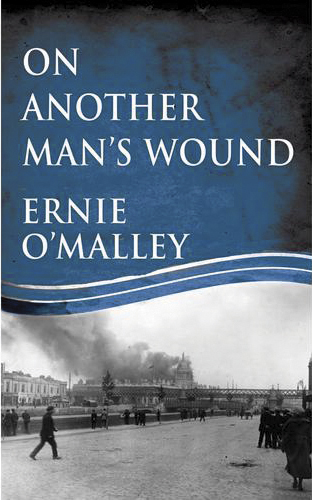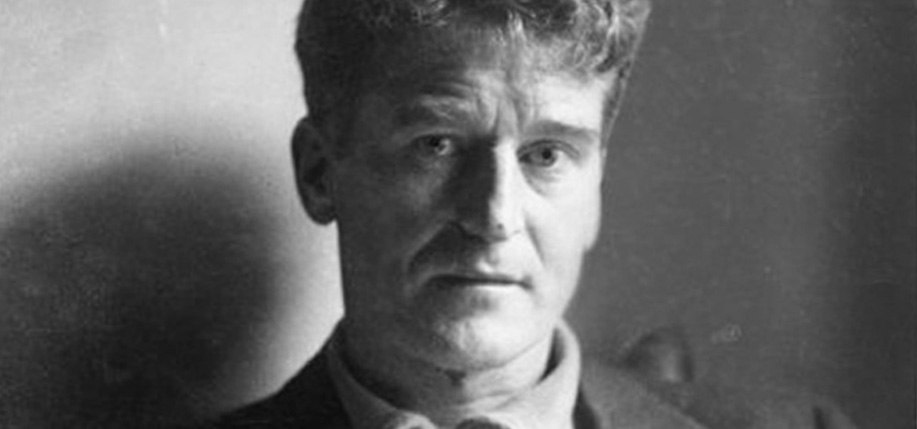Ernie O’Malley was a renowned figure in Ireland’s fight for independence. Here are his memories of 1916 as compiled by his son Cormac O’Malley.
Born in 1897 in Castlebar, Co. Mayo, Ernie O’Malley’s (Malley) family moved to Dublin in 1906 where he went on to study medicine. During the Easter Rising O’Malley came to share the vision of the rebels, and left his medical studies in 1916 to join the Irish Volunteers, training units throughout the country. He was involved in many exploits, and following capture made a daring escape from Kilmainham Gaol.
In the following letter from Kilmainham dated November 25, 1923, to Mrs. Molly (Erskine) Childers, he explains that the Rising had an immediate impact on him and how the initial negative public opinion in Dublin changed quickly. And about ten years later, while in America, O’Malley wrote a memoir, On Another Man’s Wound, about his Irish War of Independence experience, including his memories of Easter week, 1916.
Letter from Kilmainham
Then came like a thunderclap the 1916 Rising… I was down town that [Easter Monday] morning and passing Trinity [College] was asked by a man I knew if I would go in and I would get a rifle. I agreed and was going in the gate when a boy who lived near my place who had accompanied me and who felt strongly nationally (but has never ‘done’ anything) told me not to be a fool, but to tell them I would consider and come back later. On the way home he pointed out to me the disgraceful fact that I was about to take up a rifle to shoot down my own countrymen. Previous to this I had heard little of the Irish Volunteers, but at home we always laughed at them as toy soldiers. Before the [Easter] Week was finished I had changed. When I heard of the executions I was furious.
On Another Man’s Wound

Easter Monday, a holiday, was warm… I walked across the city over the Liffey to the south side….I passed Trinity College, the heavy oaken doors were closed. In O’Connell Street large groups of people were gathered together. From the flagstaff on top the General Post Office, the GPO, floated a new flag, a tricoloured one of green, white and orange, the colours running out from the mast.
“What’s it all about?” I asked.
“Those boyhoes, the Volunteers, have seized the post office. They want nothing less than a Republic,’ he laughed scornfully.
I walked up the street. Behind Nelson’s Pillar lay dead horses…. On the base of the Pillar was a white poster. Gathered around were groups of men and women… I began to read it with a smile, but my smile ceased as I read [the Proclamation]:
The Provisional Government of the Irish Republic to the People if Ireland
….We declare the right of the people of Ireland to the ownership of Ireland and to the unfettered control of Irish destinies, to be sovereign and indefeasible…”
℘℘℘
I was walking home when I met three boys from Trinity College … …arrogantly pro-British.
“We are collecting our people, as we want to defend Trinity. It may be attacked. Will you come along?”
“I’m going home now, but I will be back to see you later,” I said.
As I continued my way I met another boy whom I knew. He was jubilant…So he was in favour of the rebels.
“Well, I am going back to Trinity in the evening. I was offered a rifle,” and I chuckled.
“Why? What is Trinity to you? … “It’s not your university. Remember you’ll have to shoot down Irishmen, your own countrymen. You bear them no hatred. If you go in there you cannot leave; and mark my words, you’ll be sorry ever afterwards. Think it over.”
℘℘℘
All through the evening rumours piled on rumours. I had thought over what the art student had said; and somehow I did not go to Trinity.
I found little changed on O’Connell Street the next day. The GPO had been more thoroughly barricaded; other shops had been looted.
I walked around in a detached manner. I had no feeling for or against, save irritation at those fellows for doing the unexpected, seizing the Post Office and the other buildings. That night the military proclaimed martial law in Dublin.
℘℘℘
I felt faint stirrings of sympathy as I wrote in my diary. I did not feel indifferent now to the men holding Dublin. The shelling and noise continued. The people seemed a little cowed.
Distant sounds of firing had new sounds that echoed in my head. They meant something personal; they made me angry. The men down there were right, that I felt sure of. They had a purpose which I did not share. But no one had a right to Ireland except the Irish. In the city Irishmen were fighting British troops against long odds. I was going to help them in some way.
I met a boy who had been to school with me… We were of the same mind trying to aid the men in Dublin. He had …never joined the Volunteers. “I know where there’s a [Mauser] rifle … There’s ammunition also in clips.” I arranged to meet him that night and went shooting from bank top and bridges.
The note of resentment softened a little among the people. . I heard expressions of sympathy for “those poor devils”…. “Damn it, anyhow. .. they’re Irish” – “they’re our own.” I felt the same but I did not know how to help.
℘℘℘
Later in the day came news of the surrender of the men in the GPO. For another day the firing continued, then it died away. … The GPO was a shell, from which the tricolour still floated. The stout walls were blackened but they held.
The prisoners were transferred to the different Dublin barracks; raids and arrests took place and prisoners came to Dublin from all over Ireland. The bitterness of the people against the Volunteers was tinged with a little admiration. They had fought well against regular troops. Many hoped they would all be hanged or shot.
℘℘℘
Four days after the surrender a brief announcement: three men had been shot at dawn – Pádraig Pearse, Tom Clarke, Thomas MacDonagh. Next day four were executed and the following day one, Major John MacBride… I had felt resentment at the death of the others; now a strange rage replaced it… I wandered around all day wondering what I could do to help, cursing under my breath, meeting few I could feel any sympathy with, for my friends were all hostile to the spirit of the Rising.
Some of the people resented the executions … Something strange stirred in the people, some feeling long since buried, a sense of communion with the fighting dead generations, for the dead walked around again.
℘℘℘
Tricolour badges were worn on coats, caps and hats; songs were whistled and sung. “The Soldier’s Song” began to be known; soon one could hear it in the streets.
The surge of a rebirth of feeling, of a national spring in the air. The fierce exultance of song expressing a buried national feeling.
Photographs of the executed leaders were in every small shop. Names of men who had been practically unknown two weeks before were now on the lips and in the hearts of many. P H Pearse, Thomas MacDonagh, and Joseph Mary Plunkett were poets. … I reconstructed their work and their ideals. I bought and read everything that breathed their spirit.
There was much distress amongst the people. Over 3,000 had been killed or wounded. The arrests, numbering over 3,000, meant a further drain on resources. … Rebellion disaffection, as it was called, was going to be stamped out.
The executions had caused bitter feelings and the arrests and the strict enforcement of martial law helped to intensify it. The people as a whole had not changed; but the new spirit was working slowly, half afraid, yet determined. The leaders had been shot, the fighting men arrested and the allied organisations had been disrupted. Without guidance or direction, moving as if to clarify itself, nebulous, re-forming, the strange re-birth took shape. It was manifest in flags, badges, songs, speech, all seemingly superficial signs. It was as if the inarticulate attempted to express themselves in any way or by any method; later would come organisation and cool-headed reason. Now as the lyrical stage, blood sang and pulsed, a strange love was born that for some was never to die till they lay stiff on the hillside or in quicklime near a barrack wall…
The university was changed now for me – new associations, new affiliations… We were hammered red-hot in the furnace of the spirit and a spark was bound to fly and disclose us to each other, with a word, a look, a chance remark. ♦


Leave a Reply